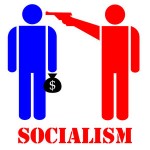 In a recent interview with CNN’s Piers Morgan, socialist documentarian Michael Moore — who, not coincidentally, made a socialist propaganda movie called Capitalism: A Love Story — revealed Monday (September 27th, 2011) what we all already knew: he has no understanding whatsoever of what capitalism really is.
In a recent interview with CNN’s Piers Morgan, socialist documentarian Michael Moore — who, not coincidentally, made a socialist propaganda movie called Capitalism: A Love Story — revealed Monday (September 27th, 2011) what we all already knew: he has no understanding whatsoever of what capitalism really is.
The video clip won’t embed, but you can watch it here (and I suggest you do).
This is what Michael Moore said:
When you say the word capitalism, you have to talk about it in its current sense. You can’t told about the old days or the way maybe, you know, Adam Smith. The sort of old capitalism….
[In the] old days when you worked hard and prospered, everyone else prospered as well. And not only that, as you prospered, the wealth was shared with your employees, with the government. Everybody had a piece of the pie. You, who started the business or invented the light bulb or whatever, you got a bigger piece of the pie. And you know what, nobody cared because you invented the light bulb. That was a pretty cool thing….
None of the major religions, in fact they all, say it’s one of the worst sins you could commit, is to take such a large piece of the pie while others suffer.
Isn’t that heavy?
But the truth is, capitalism is the diametric opposite of what Michael Moore would have you believe.
What is capitalism?
Capitalism is a social system based upon private ownership of the means of production and the preeminence of the individual over the group.
This issue — capitalism-versus-socialism — hinges upon one thing, and this one thing is the only thing you’ll ever need to know about the subject: private ownership (capitalism) versus public or government ownership (socialism).
Do we each own ourselves and (corollarily) our property?
Or do others own us and our property?
Money is property.
Capitalism is an entire political theory — not, as is sometimes supposed, merely economic.
The exclusively economic component of capitalism can be described as the right to life, liberty, and property applied to commerce and industry.
Pure laissez-faire capitalism, which does not exist now and has never existed fully, means that government removes itself from all commerce (and that includes healthcare), in the same way that government removes itself from the bedroom.
In addition to early America, there is at least one other society that has come close to laissez faire capitalism:
“After the War Hong Kong had no minimum wage, low and simple taxes, zero tariffs, zero capital controls, and a stable legal environment. Postwar Hong Kong went as far with economic laissez faire as any other country in history. This resulted in economic development that benefited virtually all the people of Hong Kong. Living standards increased substantially even for the poorest people in Hong Kong” (Stefan Karlsson, “Inflation Leads to Protectionism,” 2004).
Capitalism means that commerce and industry are entirely privatized.
Corporations that receive government subsidies are not capitalistic. They’re the opposite: they’re mercantilistic.
The same is true of small businesses and farms that receive subsidies.
Trade tariffs are not capitalistic but mercantilistic.
Mercantilism is an ancient and more primitive form of socialism. It is socialism before Karl Marx.
Political theory is the theory of government, and government, properly defined, is the body politic that possesses rule over a certain specified geographic region.
Economics is the science of production and exchange, but production does not just mean agriculture, although that is certainly included.
Productive work is any kind of work geared toward the task of survival — survival in the fully human sense of the word, including, therefore, arts, sports, industry, and so on.
Thus the essential questions of government are these:
Do humans exist by right or by permission?
Are we free by nature?
If so, why?
Are we free to produce, exchange, and exist, or do politicians, elected or not, have authority and jurisdiction over the lives of us — to any degree?
Obviously, there’s only one sane answer to all these questions; for to say that humans do not exist by right is the same as saying humans only exist when someone permits us to. But if that were true, we must then ask: who permits? And why? And who gives these people permission?
Fundamentally, political freedom can be achieved only through recognizing each and every single individual’s right to life.
If, then, you believe that we are each individuated and sovereign, and if you believe that our lives are entirely our own and not the government’s and not another’s, if, in short, you believe “we each have a property in our person,” as John Locke said, then you believe in the inalienable right to life, liberty, and property.
You believe, therefore, in laissez-faire capitalism.
More here on the many permutations of socialism.



